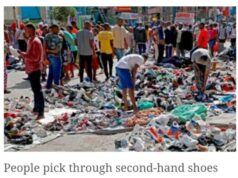AFP || Orthodox Christian leaders in Ethiopia on Friday denounced what they described as a surge in violence that has seen dozens of churches burned to the ground.
As they celebrated one of the year’s most significant holidays — Meskel, or “the finding of the cross” — church officials urged Prime Minister Abiy Ahmed to protect them and hold perpetrators of religious violence to account.
“The Orthodox Christians are not happy with the government,” Aklil Damtew, the church’s project coordinator, told AFP.
“The people expect the government to say something about the church. Why is the government remaining silent?”
Rising tensions between the Orthodox leadership and Abiy’s administration risk introducing a new element of instability in a country already grappling with ethnic violence ahead of elections next year.
Meskel marks the finding by Saint Helena of the “true cross” on which Jesus was crucified. It began Friday afternoon with Demera, a ceremony that drew tens of thousands of people to central Addis Ababa, the capital, for hours of dancing, chanting, drumming and prayer.
On Thursday night, federal police issued a statement warning that “some forces” were “preparing to disrupt the Meskel celebrations.”
But the Demera ceremony unfolded without incident. After an hours-long parade featuring motorised floats bearing giant crosses, the crowd lit wax candles and looked on as a giant bonfire burned in the city’s most prominent square, known as Meskel Square.
– ‘Unprecedented’ –
The holiday is coming after two consecutive Sundays of peaceful protests in the country’s Amhara region against church burnings.
At least 25 churches have burned down throughout the country over the past two years, Aklil said, adding that the figure was unprecedented. The church’s tally of attacks is difficult to verify.
Orthodox Patriarch Abune Mathias used his Meskel message on Friday to condemn the burnings.
“Those who are burning our churches must stop such acts,” he told the crowd at Meskel Square, drawing cheers.
“We can’t accept at all those who would burn churches or attack our followers. Nothing good can come from this.”
Church officials say the burnings reflect anti-Orthodox sentiment, but the motives for the attacks are likely more complex.
Some of the burnings, for example, took place in July after a bid by ethnic Sidama leaders to form a new southern regional state kicked off days of unrest.
Terje Ostebo, an expert on religion in Ethiopia at the University of Florida, said conflicts that appear to be rooted in religion are often also shaped by disputes over land use, ethnicity and other issues.
“These things are always entangled and I’ve had so many cases where I’m trying to figure out a local conflict that was presented as ethnic or religious, but it turns out they were both,” he said.
Nevertheless, Endale Gosaye, a 35-year-old marketing professional who attended the Demera ceremony, said he agreed with church leaders who believe Orthodox Christians are under threat in Ethiopia.
“It’s disgusting people who are doing that,” he said of the burnings. “We want them to have a good heart because people are starting to follow them.”
He said he was dissatisfied with the government’s response to far.
Daniel Bekele, chief of the Ethiopian Human Rights Commission, said the attacks should be investigated.
“The government has a responsibility to investigate whoever might be behind an attack on any religious institution,” he said.
Along with the burnings, Orthodox leaders are angry about an attempt by some members of the Oromo ethnic group, Ethiopia’s largest, to break away and form a new church faction.
Orthodox Christians make up roughly 40 percent of Ethiopia’s 110 million people.



























